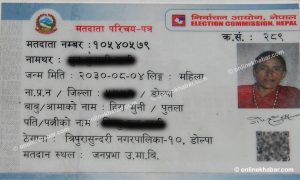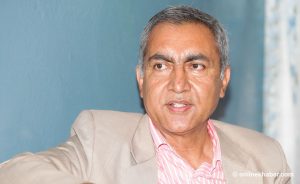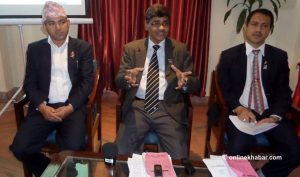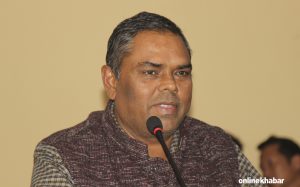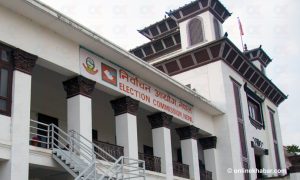
The country is gearing up for local level elections. Political parties are busy drafting manifestos and selecting candidates. But, they have not done much towards educating the people about the rights and responsibilities of civic bodies, neither do they have any immediate plans to do so. Aspirants for political offices at the grassroots are also not clear about how rural municipalities are different from the erstwhile VDCs. In this context, Onlinekhabar talked to the local leve restructuring commission chief Balananda Paudel. Translated Excerpts:
You finally submitted your report to the government. Do you feel you accomplished what you set out to do?
When we fixed the number and territory of local bodies, we kept the constitution’s vision for rural municipalities in our mind. That was how we decided on their rights, roles and responsibilities and the political and bureaucratic structures they need.
The constitution says the state has three levels of governments: centre, province and civic bodies, and people running each of the levels have their right to exercise the executive, legislative and judicial powers of the state.
According to schedules VIII and IX of the constitution, the local levels also have executive power. They prepare budget plans, prioritise issues and implement plans of action. They recruit and manage staff and generate resources. On the judicial part, there shall be a three-member judicial committee headed by the vice-chairperson and it will solve local disputes. Schedule VIII also has a provision of local courts at the local level. Similarly, local representatives have the authority to legislate on different sectors in their own area.
But why do the parties think the new local levels are same as the VDCs and municipalities of the past?
This is what we are struggling hard to make them understand. People raised their eyebrows when we at first said the local levels have such power. Then, we feared we might have misread the constitution, hence we re-read the document. But, we were right. Finally, the parties have understood it.
The Prime Minister recently said that the constitution brings Singha Durbar to the grassroots. Yes, he was right in saying that because some of the work Singha Durbar does now has been delegated to the local bodies.
The debate over local bodies now seems to be on the number rather than their rights. Do you think this will cause problems later on?
Yes, this is a crucial issue. We need to urge political parties not to take this issue lightly. The local bodies are a form of government. Among the three levels of government, they are the most significant ones.
Responsibilities of chiefs and deputy chiefs of rural municipalities and municipalities are bigger than those of the Prime Minister!
Why is it so?
It is because the central government is linked with the people indirectly. It indirectly collects revenue and rules over the people. Therefore, people do not get to question the central government much. When the local level governments begin operation, people will know the system and question its works. Therefore, the local level government should be more responsible towards the people. The political parties should understand this in time; if they don’t, they will regret tomorrow.
So the parties should be very careful while selecting candidates…
Yes, let me reiterate: responsibilities of chiefs and deputy chiefs of rural municipalities and municipalities are larger than those of the Prime Minister! At the centre, there are different people to lead the executive, legislative and the judiciary; the PM, the Speaker and the Chief Justice are there. But at the local level, the chief is both the PM of the local executive and Speaker of the local legislative. The deputy chief is just like the Chief Justice, who is responsible for judicial matters. The local leadership should be more responsible than the central one.
So, what are your recommendations for the parties who will soon be picking candidates?
The candidates should have a sound political understanding. They should know their parties’ manifesto. More importantly, they should be able to put forth a clear vision on how they will operate the local levels for the next five years.
As legislators, they should be able to formulate laws. They need to have honesty for the same. They need to have executive skills and negotiation skills to coordinate with provincial and central governments. They should have sound financial management skills as they might need to face budget deficits and look for loans. Parties should keep these issues in mind while selecting candidates.
If the parties fail to recognise the weight of these responsibilities, the candidates will surely suffer. In addition to that, the people will also suffer. The parties will suffer. The local level bodies are so close to the people that their actions directly affect the citizens.
Many countries are already practicing the system that we have proposed. This system makes the governance more efficient, accountable and transparent

Meanwhile, there are who say that the local bodies won’t be able to cannot shoulder all these responsibilities.
During the past also, the Local Self-Governance Act had given many rights and responsibilities to the VDCs; but many of them were never implemented. Therefore, the VDCs restricted themselves in making recommendations and spending a little money they received from the government as a grant.

Now, the rights that have been delegated to the local levels are huge compared to what the VDCs had been doing. Therefore, it is natural to question the ability of local leaders to take on the challenge. But, my answer to this would be: no nation will suffer by giving more rights to local bodies. Many countries are already practicing the system that we have proposed. This system makes the governance more efficient, accountable and transparent.
Further, I propose that we adopt the direct tax system. We need it if we are to improve governance. It is a must to sensitise people on this. There are many Nepalis who have not understood that the government functions out of the tax they pay. (Do you know that the customs duty imposed on the jacket you wear will be used to pay the Local Level Restructuring Commission’s chief? Very few know it.)
Developed countries are gradually shifting towards the direct tax system. People in such countries have realised that they are the taxpayers and the state fund is made of their own money. Our donors also say that they have been giving us money they collected as tax from their own people. Unless the taxpayers ask questions, the government cannot be responsible.
The Madhesh-centric parties are demanding that local bodies should be under the ambit of the province…
The question is related to what kind of federalism we want to introduce in Nepal. We studied all agreements and decisions of both the Constituent Assemblies and found that the first Constituent Assembly had unanimously decided to go for three-tier federalism; and the second one owned up to the same.
It is a different issue that the Madhesh-centric parties took a different course when the constitution was promulgated.
Federalism is not an end in itself, it is just a means. It is a means to deliver facilities to people and make them satisfied. Therefore, Nepal has accepted three-tier federalism. But, of course, there are many countries that believe in two-tier federalism.
The more rights we take closer to the people, the more are the chances that federalism becomes effective and transparent. I think the constitutional provisions on federalism are appropriate as they have taken the rights to the people’s doorsteps. We should be positive about it.
Even today, there are many feudalistic practices in Madhesh while the hills have already renounced it. The rights should be taken to the grassroots to get rid this problem, and that is why I think Madhesh needs local bodies of the type we have recommended, more than any other area.
If we are to keep the provinces under the ambit of the centre, and local bodies under the province, the essence of federalism will die. The constitution says the three levels should have an interrelationship on the basis of coexistence, co-operation and coordination. No government entity at any level should be subordinate to any other.





